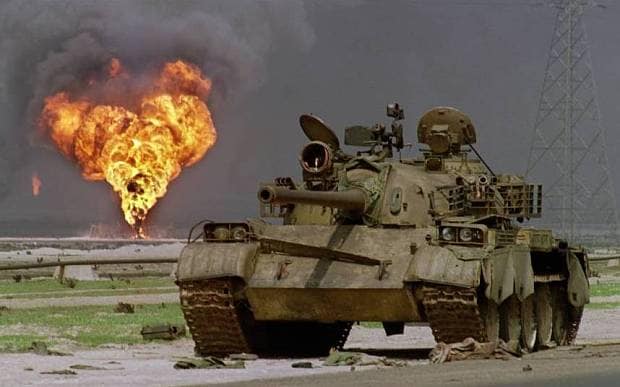By Ben Garcia
KUWAIT: Kuwait marks tomorrow the 31st anniversary of the country’s liberation from the Iraqi invasion. Filipino expats Rosalinda Dagumboy and Emenda Bonilla are former domestic helpers who came to Kuwait in 1989 and witnessed the Iraqi invasion of the country a year later. Both are now in their early 60s. One received compensation, while the other didn’t. In the early morning of Aug 2, 1990, Bonilla remembered the sound of bombs and guns which awakened the family she used to serve. “At that time we were in my boss’ house in Jahra and were sleeping. We were suddenly awakened by a huge explosion. The sound of sporadic firing followed,” she said.
“In the morning that day, we heard an oil depot was bombed, so we went to Sulaibikhat, the family home of my boss. We were placed in the same compound with the rest of the family members. We were all scared. The situation outside our compound was frightening, as people were afraid of what was going on and what could be next,” Bonilla reminisced.
“We were stuck in the house in Sulabikhat for days. Thank God, we had food delivered to us, but there was no electricity and water. We had a water tank inside the compound that sustained us for a few days. These are the things I remember until we left Kuwait on August 9 to head for safety in Saudi Arabia,” she recalled.
On their way to Saudi Arabia by land, the family had to deal with many checkpoints. “When the family of my boss decided to leave for Saudi, they asked me if I was willing to join them. I told them I have nowhere to go, and I didn’t want to stay at our embassy, so they took me along with them. There was no telephone and no means of communications available to contact my family back in the Philippines. We stayed in Saudi Arabia for eight months. We came back to Kuwait in April 1991 before Ramadan. Kuwait was still on fire, with smoke from oilwells still very visible. This is my unforgettable experience of the Iraqi invasion. It was a hard ordeal for my boss and the rest of us,” Bonilla told Kuwait Times.
Bonilla continued working with her boss until she got a release from household work in early 1993. She then started a new job at a bakery, where she works until this day. “After about 6 or 7 years, I got my war compensation, which helped me buy my own piece of land in the Philippines and a house. The total compensation I got was 200,000 pesos (around KD 1,200),” she said.
Dagumboy was a domestic helper in Sabah Al-Salem during the Iraqi invasion of 1990. Her experience was different compared to Bonilla, as she stayed in Kuwait throughout the war and during Operation Desert Storm by Allied forces. “I was here the whole time, but in the middle of the occupation in December 1990, my sponsors decided to send me to the Philippine Embassy. At the embassy, the plan was to go by land to Jordan in order to be sent back to the Philippines,” she said.
“I found it hard to go back to Manila, so I left the embassy and went to my friend’s house in Salmiya. I remember for more than a month, we had no electricity and water. It was hard because intermittently, Iraqi soldiers would knock and check our apartment to look for Kuwaitis. Some Filipinas were taken by the Iraqis, but they were returned in a day. The good thing was that we were never without food,” recalled Dagumboy.
After the war, Dagumboy said it was easy to get a job. “I stayed in Kuwait without a boss for about a year before I got a job with Al-Yasra. I stayed with Al-Yasra for five years before I got a job at Al-Shaya in 2000, until I retired in 2020. I was supposed to go home after retiring, but I couldn’t leave Kuwait easily. I love this country, as it has been my second home. I also have my children here who are working. I look after my grandchildren too, so I haven’t left Kuwait till now,” she told Kuwait Times.
Asked if she got compensation like Bonilla, she replied in the negative. “No, I did not get any. They told me to bring all my documents, which I provided, but I didn’t get a fils,” Dagumboy said.











